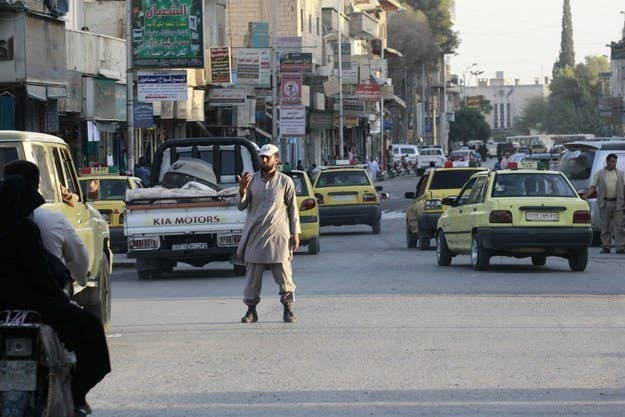
ISTANBUL — The Obama's administration's first airstrikes in Syria were its most expansive against the extremist militants known as the Islamic State of Iraq and Syria (ISIS) to date, bringing the U.S. deep into the country's complex civil war overnight.
The attacks, which began late Monday, underlined the questions that have plagued deliberations about possible U.S. strikes in Syria from the start: How much will they actually hurt ISIS? And who inside Syria stands to gain?
The strikes also raised a new question, amid reports that an additional extremist group was also targeted: Who is America fighting in Syria?
U.S. warplanes have been bombarding ISIS for six weeks inside Iraq. But no single day has seen an onslaught like the one unleashed in the Syria strikes. The Pentagon said U.S. fighter jets and warships launched more than 20 missile attacks spanning several hours. Reuters cited an activist group that monitors the conflict as saying that the strikes had hit at least 50 targets. The sudden attacks were more aggressive and expansive than many had anticipated, given that for more than three years, the Obama administration has shown a deep reluctance to get involved in the conflict.
The U.S. Central Command said in a statement that five Arab countries — Bahrain, Jordan, Qatar, Saudi Arabia, and the United Arab Emirates — assisted with the attacks against ISIS in Syria. The statement said there were 14 strikes against ISIS that "destroyed or damaged" multiple targets in the vicinity of the group's stronghold in the eastern city of Raqqa as well as in three other areas. It said the strikes hit ISIS "fighters, training compounds, headquarters and command and control facilities, storage facilities, a finance center, supply trucks, and armed vehicles."
But the U.S. was alone in expanding the attacks to a new group: Jabhat al-Nusra, the Syrian affiliate of al-Qaeda. In recent days, U.S. officials had sounded the alarm about an al-Nusra cell they called Khorasan, which they said was actively plotting attacks on America. They said the U.S. had conducted eight strikes against the cell — which was discussed openly by U.S. officials for the first time only last week, when James Clapper, the director of national intelligence, publicly warned of it at a conference.
It seems unlikely that many Syrians who support al-Nusra because it has focused on fighting the Syrian regime, unlike ISIS, which has warred with other rebel groups in a fight for territory, would see the distinction between al-Nusra and Khorasan that U.S. officials have sought to make in recent days. In its statement, the U.S. Central Command stressed the idea that the Khorasan cell was attacked in order to "disrupt the imminent attack plotting against the United States and Western interests."
Aaron Zelin, an expert on extremist groups at the Washington Institute, told BuzzFeed News that there is "no difference at all" between al-Nusra and Khorasan.
ISIS and al-Nusra, meanwhile, were allied in Syria until early this year, when they split in a power struggle, prompting al-Qaeda leader Ayman al-Zawhiri to publicly disown ISIS. The two groups have since begun warring inside Syria — making al-Nusra one of ISIS's most powerful enemies inside Syria.
The attacks on both groups highlighted the murky nature of alliances in the rebellion and the difficulties the U.S. will face as it steps into the war. Many rebel groups consider al-Nusra a vital ally against their prime enemy, Syrian President Bashar al-Assad.
The idea that strikes against ISIS might help Assad is up for debate — while the group has fought the regime on occasion, it won its strongholds inside Syria from other rebel groups and has focused mainly on fighting rival rebels for much of the last year. But strikes against al-Nusra — which has been one of the most effective groups in fighting Assad — seems more likely to boost the regime.
Assad's government, for its part, announced on Tuesday that the U.S. had warned it before launching the strikes, though this could have been an effort to save face. Obama has also called repeatedly for Assad to step down.
Adding to the confusion, Israel announced on Tuesday that it had shot down a Syrian warplane that had crossed into its territory.
The head of Syria's U.S.-backed political opposition-in-exile welcomed the strikes in a statement, but stressed that moderate rebels need better arms and training in order to defeat ISIS. Some moderate rebel groups receive covert U.S. military support already, while a $500-million Pentagon program approved by the Senate last week will offer more training and arms. But these groups remain weak on the ground and unlikely to capitalize on the strikes.
With that in mind, it remained unclear how far these strikes, or any in the immediate future, would go in achieving Obama's stated mission on ISIS: to degrade and ultimately destroy it. While Obama has repeatedly ruled out sending combat troops to Iraq or Syria, a sense of mission creep has emerged of late. In a BBC interview on Monday, former U.K. Prime Minister Tony Blair said boots on the ground might be needed to defeat ISIS. More importantly, last week the chairman of the U.S. joint chiefs of staff, Gen. Martin E. Dempsey, said that he remained open to asking Obama for the option of using ground forces in the fight against ISIS.
Yet public opinion, while it has rallied quickly around the idea of ISIS airstrikes, remains opposed to the idea of sending combat troops back to the Middle East.
